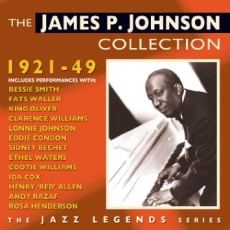
Daily Dose Of Jazz…
James P. Johnson was born James Price Johnson on February 1, 1894 in New Brunswick, New Jersey and was also known as Jimmy Johnson. A move to San Juan Hill, where Lincoln Center stands today, and subsequent move uptown by 1911, exposed him to the musical experience of New York City’s bars, cabarets and symphonies and listening to Scott Joplin attributed to his early influences. With perfect pitch and excellent recall he was soon able to pick out on the piano tunes that he had heard.
Johnson got his first job as a pianist in 1912, left school to pursue his career in music. From 1913 to 1916 Johnson spent time studying the European piano tradition with Bruto Giannini, spending the next four to five years studying other pianists and composing his own rags. In 1914, he met Willie “The Lion” Smith and became best friends. By 1920 he had gained a reputation as a pianist on the East coast on a par with Eubie Blake and Lucky Roberts, making dozens of piano roll recordings and recording for the Perfection, Artempo, Rythmodik, QRS and Aeolian labels.
James was a pioneer in the stride playing of the jazz piano. He developed into the favorite accompanist of Ethel Waters and Bessie Smith. He continued to compose and record during the 1920s and 1930s he recorded on W. C. Handy’s Black Swan label as well as Columbia. He branched out and became musical director for the revue Plantation Days, went to Europe with the show that toured for five years and made it to Broadway.
By the Depression Era his career slowed down somewhat and he found it difficult to adapt to the new swing era music gaining popularity. In the late 1930s Johnson slowly started to re-emerge with the revival of interest in traditional jazz, but suffering a stroke in 1940 took him out of the action until 1942 when he began to record, with his own and other groups with Eddie Condon, Yank Lawson, Sidney de Paris, Sidney Bechet, Rod Cless and Edmond Hall. He went on to record for jazz labels Asch, Black and White, Blue Note, Commodore, Circle and Decca, perform with Louis Armstrong and was a regular guest on the rudi Blesh This Is Jazz broadcasts.
He would teach Fats Waller his Carolina Shout composition, Duke Ellington learned it note for note from his piano roll and the tune became a right of passage for every contemporary pianist. Considered the last major rag pianist and the first major jazz pianist he became the bridge between the two styles. His influence led to the emergence of Art Tatum, Donald Lambert, Louis Mazetier, Pat Flowers, Cliff Jackson, Hank Duncan, Claude Hopkins, Count Basie, Ellington, Don Ewell, Jimmy Guarnieri, Dick Hyman, Dick Weststood, Ralph Sutton, Joe Turner, Neville Dickie, Mike Lipskin and Butch Thompson.
Pianist and composer James P. Johnson, who composed the Roaring Twenties theme song Charleston, along with If I Could be With You One Hour Tonight, and whose music has appeared in countless films, passed away on November 17, 1955 at age 61.
More Posts: piano


